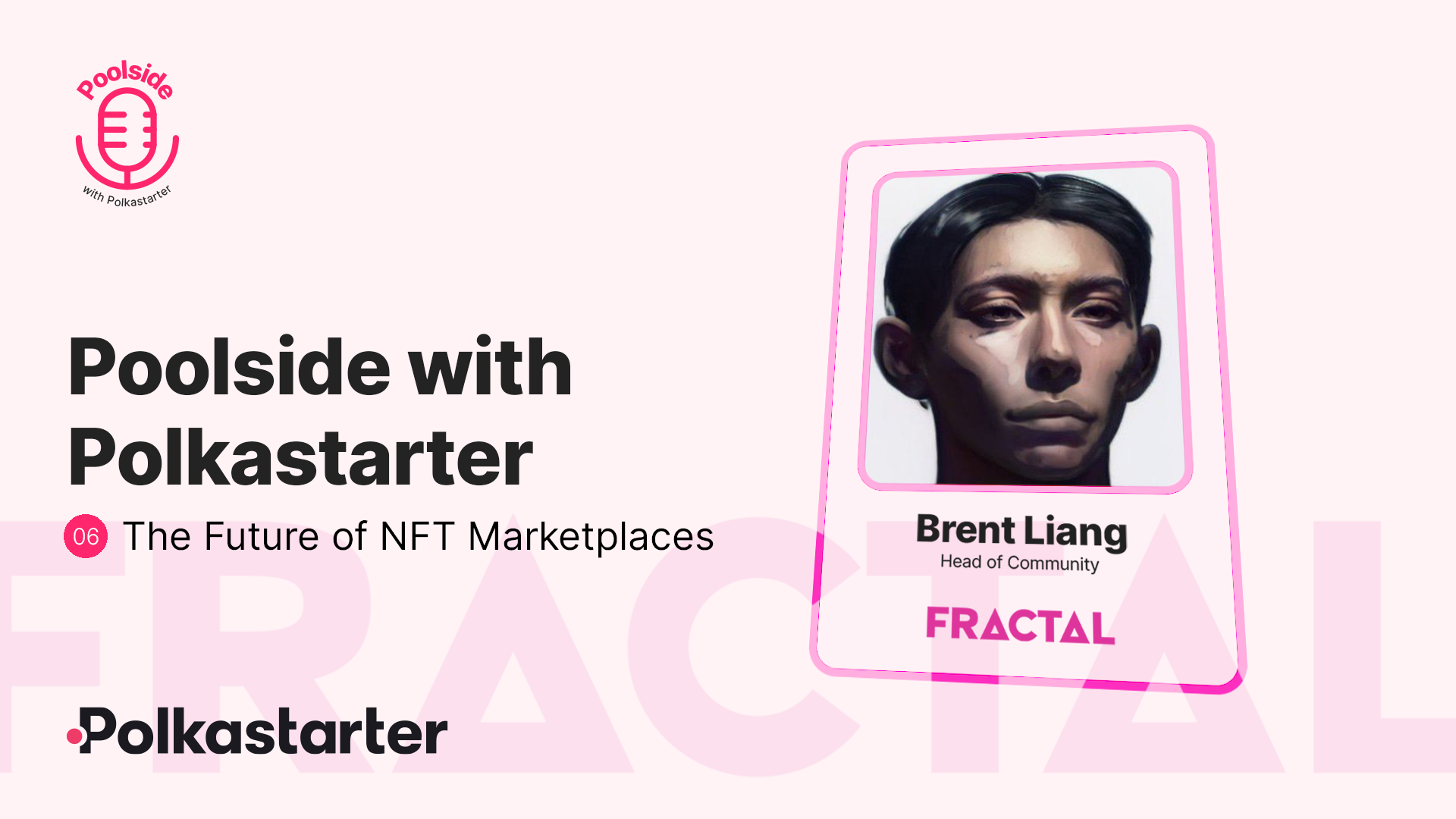
Poolside with Polkastarter 06: The Future of NFT Marketplaces Recap
Another week, another podcast episode from us here at Polkastarter.
This time around, we managed to steal some time from Brent Liang, Head of Community at Fractal, to talk about the NFT marketplace evolution and the NFT gaming growth.
It seems like Poolside with Polkastarter is a podcast that resonates with people who share the same passion we have for the crypto space. Following the great success of our last episode, The Future of NFTs, we decided to go even deeper into the same vertical and discover some more about the future of the NFT marketplace.
The expert voice on this podcast was Brent Liang, Head of Community at Fractal. First, let’s revisit some of the most important discussion points.
Brent Liang
Brent works on Fractal’s community and gaming side, a web3 gaming marketplace aiming to optimize gaming experiences for gamers and gaming developers. The company wants to pave the future of blockchain gaming. Having been a gamer since he was 8, Brent is excited to be at the forefront of this evolution and be involved in such an exciting project as Fractal.
More on Fractal
For anyone interested in being involved in the development process, buying into, or playing games, Fractal is the place to go. You can either back a game or play and participate in a game tournament and win money. The company wants to eliminate gaming friction and simplify the experience for people entering the web3 gaming space.
Game selection process
Fractal follows a rigorous selection process for the games that make it to the launchpad and website. The reason behind the bulletproof due diligence resides in the fact that the company wants to avoid scams and rug pulls that flooded the industry in its birth. Letting a fraudulent project on is not only damaging to Fractal but to the entirety of the ecosystem.
The first step of the process concerns the dev team behind the game and whether they legitimately have the experience to deliver a high-quality, playable game. The team at Fractal then spends a lot of time testing the game and ensuring it delivers a smooth experience from a gaming standpoint. Yes, the technology behind the game sets it apart from traditional gaming, but we should never forget that a game should be easy to understand and play by the end-user.
The Fractal marketplace
Fractal wants to bring discovery elements to its marketplace. Once the players discover a game, they can participate in tournaments and form opinions on whether they want to back the project. Instead of reading the whitepaper, they get to experience it first hand. Then, after the tournament, players have the context to support a project.
What are the challenges that Fractal faces at the moment?
The main challenge for Fractal is optimizing games for fun, reaching web2 gamers who look at the games on the Fractal platform and can’t resist them. They want to create fun and attractive games that even people who are not sure about web3 gaming give a try.
Why would someone want to switch from web2 to web3 gaming?
To answer this question, Brent returned to his gamer days of playing endless hours of the worldwide phenomenon of a game, League of Legends. His point was that as fun and absorbing the game is, when he walks away from it, there is no actual reward he gained from it – no tangible reward or value. As a gamer, you’re essentially spending time and money (buying skins), and the result is that you’re simply getting better at the game. So if you think about it, you walk away from the game with a net loss.
With blockchain gaming, your earnings within a game ecosystem mean something outside of it. You’re not scared you’ll lose everything if a game changes its internal economy. The permissionless nature of blockchain protects your earnings. In addition, blockchain gaming allows games to have continuity, so even when a new title gets out, our progress, skins, cards, and milestones carry over to the next edition.
What happens if a traditional web2 game-integrated NFT components in its game-play?
Imagine Fortnight announced that skins are NFTs. How would a web3 game compete with the popularity and reach of such a title? According to Brent, it would be great for the space. It would bring credibility to the game, introducing new people to the web3 world.
The truth is that the web3 space needs a native game, an original title, to make some noise for the popularity to rise. Traditional studios have tried, but they always get backlash. So it all needs to start from the source.
To add to this point, Brent mentioned that streamers would play an integral role in the evolution of web3 games, the same way they have for web2. The space is still in its infancy, so we haven’t encountered someone like Ninja to spread web3 gaming like wildfire. Additionally, streaming and content creation will be massive, considering the prominent role of community in the web3 equation.
The future of Fractal: What should we expect?
The most exciting thing about Fractal is the exponential growth of games in a few months. Games are more user-friendly, playable, and look nothing like their initial releases. So how will these games look a year from now? The potential is limitless. The games are going to get better, and more and more players will join the web3 space.
Listen to the full episode:
